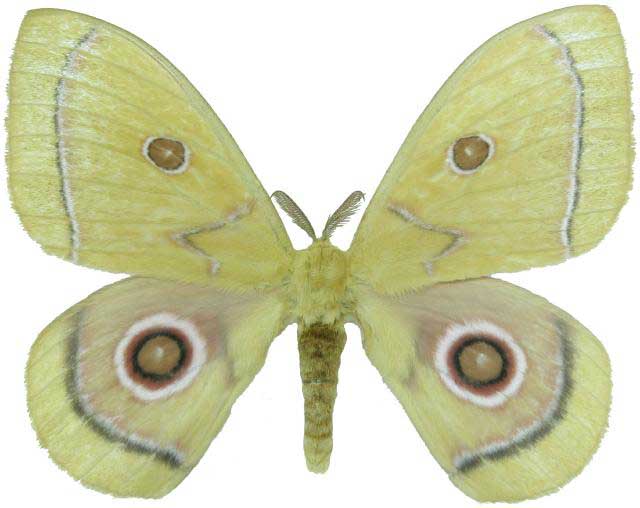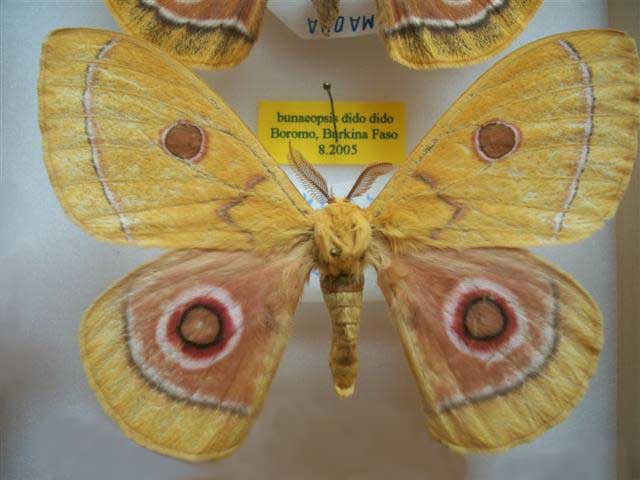Bunaeopsis dido
|
|
Updated as per Bouyer's Catalogue of African Saturniidae, 1999, April 5, 2006
Updated as per personal communication with John Kamps (Burkina Faso: Bale Province, Boromo, August); February 2010
|
Bunaeopsis
dido
bewe-nay-OPS-ihsmmDYE-doh
(Maassen & Weymer, 1881) Eochroa

Bunaeopsis dido male, Burkina Faso, July 2006, courtesy
of Yves-Pascal Dion.
This site has been created by
Bill Oehlke at oehlkew@islandtelecom.com
Comments, suggestions and/or additional information are welcomed by Bill.
| TAXONOMY:
Superfamily: Bombycoidea, Latreille, 1802
Family: Saturniidae, Boisduval, [1837] 1834
Subfamily: Saturniinae, Boisduval, [1837] 1834
Tribe: Bunaeini, Packard, 1902
Genus: Bunaeopsis, Bouvier, 1927
|
MIDI MUSIC
Wind Beneath My Wings
copyright C. Odenkirk
MIDI CITY
ON.OFF
<bgsound src="wings.mid" LOOP=FOREVER>
|
DISTRIBUTION:
Bunaeopsis dido flies in
Burkina Faso: Bale Province: Boromo (JK).
Thierry Bouyer lists this moth
as "Incertae sedis" in his 1999 catalogue.
Incertae sedis means "of uncertain position (seat)". It is a phrase
used to define a taxonomic group where the broader
relationships are unknown or undefined.
Thus, Bunaeopsis dido may be a distinct species,
but it might also be a synonym for other similar moths
going by a different name. More scientific study is needed to
determine the relationships.

Bunaeopsis dido male, Boromo, Bale Province, Burkina Faso,
August 2005, courtesy of John Kamps.
FLIGHT TIMES AND PREFERRED FOOD PLANTS:
There is possibly only one generation per year with moths on the
wing in July-August.
Larval hosts are unknown.
ECLOSION, SCENTING AND MATING:
Bunaeopsis dido
males are probably active at night and probably come in to
lights. Females have not been collected, but it is
expected they scent at night and have a very strong ovipositing
urge.
EGGS, LARVAE AND PUPAE:
The life history is unknown.
I believe all mature Buanaeopsis larvae
excavate subterranean chambers and pupate underground.
It is hoped that this alphabetical listing followed by the
common name of the foodplant will prove useful. The list is not
exhaustive. Experimenting with closely related foodplants is
worthwhile.
Use your browser "Back" button to return to the previous page.
Go to Index for African Saturniidae
Go to Main Index for all Worldwide Saturniidae
The pronunciation of scientific names is
troublesome for many. The "suggestion" at the top of the page is merely
a suggestion. It is based on commonly accepted English pronunciation
of Greek names and/or some fairly well accepted "rules" for latinized
scientific names.
The suggested pronunciations, on this page and on other pages, are
primarily put forward to assist those who hear with internal
ears as they read.
There are many collectors from different countries whose
intonations and accents would be different.
The genus name Bunaeopsis, indicates a
similarity ('opsis' = looks like) to the Bunaea genus. That name is from the Greek
and refers to a lobed hill-dweller.
The species name dido is probably from Greek and Roman
sources, where Dido or Elissa appears as the founder and first
Queen of Carthage (in modern-day Tunisia). She is best known
from the account given by the Roman poet Virgil in his Aeneid.

